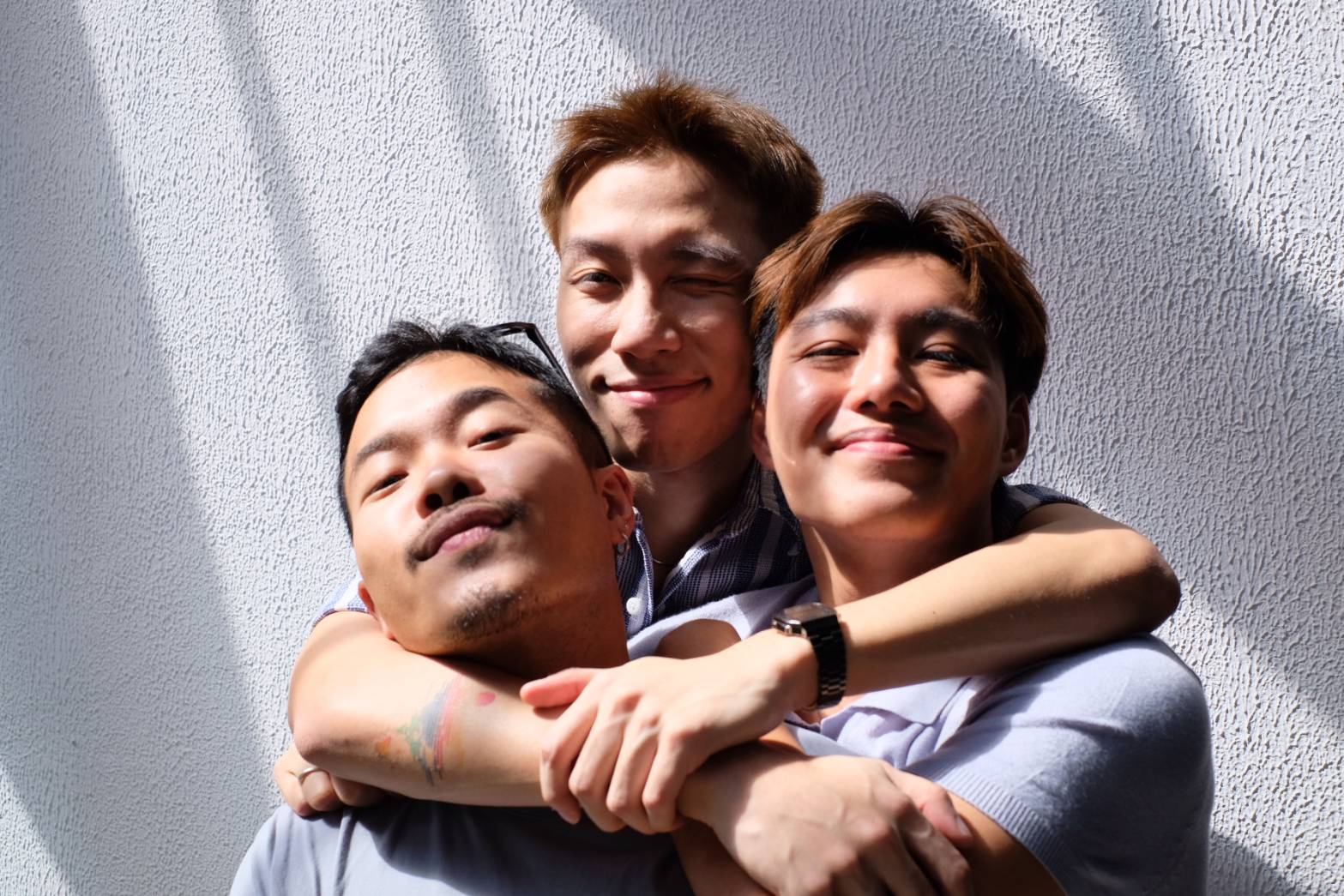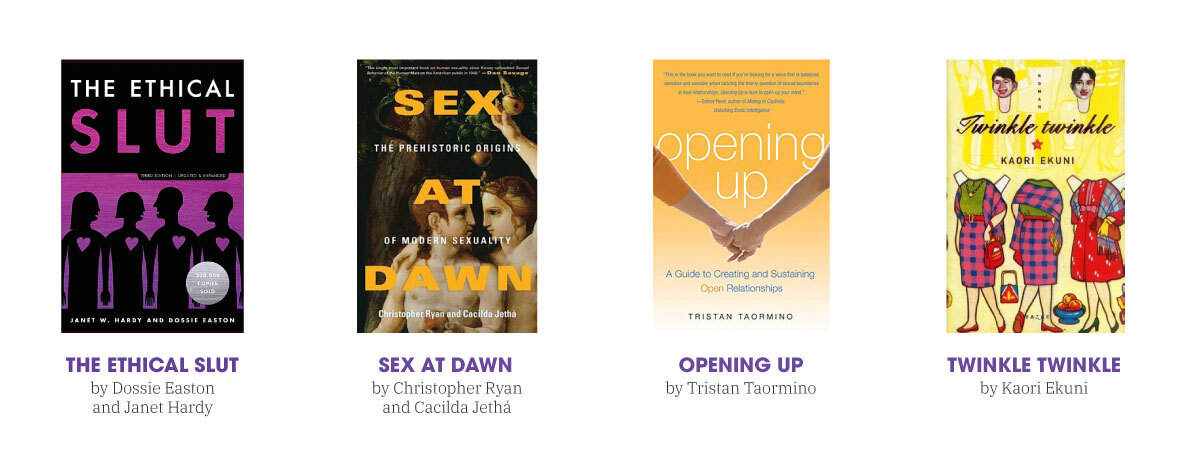BM and Poom have been happy together as a gay couple for 10 years. Over the last decade, they’ve spent their days playing piano and dueting their favorite tunes. One day, they played “
Clean” by Taylor Swift while someone named Caifa filmed their jam sesh quietly on the other end of the room. Caifa mused about harmonizing their duet into a trio, and now the throuple has just celebrated their first anniversary this year.
 From the left: Poom, Caifa, BM
From the left: Poom, Caifa, BM
In BM and Poom’s case, they fell in love with Cai at the same time. As a newcomer, Cai had his reservations, not wanting to jump in the middle of things. Fortunately, their feelings were mutual and everyone agreed that they wouldn't go forward if all of them weren’t on the same page.
“Those ten years are part of our history,” Poom says. “But from this point onward, we can just create a new one.”
With a lack of media representation—save for a
Grindr Ad which centers on a throuple in a similar situation—they really didn’t have much to go on. So, they worked out their own system. BM and Cai bond over movies. Poom and Cai bond over arts and lifestyle.
“There’s a dynamic that exists when we all hang out together, and there’s also one on one connections,” BM says. Choosing a place and time to hang out can also be tough, but taking turns has proven quite an effective solution.
When it came to introducing the throuple to their respective families, Poom’s mom was initially a little shocked. Explaining to Poom’s mother, the throuple said that relationships are all about trust. The initial reaction from Poom’s mom is also mixed with her concerns about jealousy—Thai media is littered with representations of unethical and hierarchical polyamory ending in campy catfights between wives. Exhibit A:
Raeng Ngao (2012).
To this, Poom explained that even in their family of three, there are times when mom and dad would argue but there’s no such thing as always siding with one party. In this relationship, if he’d decided to be with someone, they’re already part of the family. There will be fights but there will also be reconciliations.
Cai’s household acknowledges his sexuality but it doesn’t come up often. After he threw himself into a throuple, Cai moved into their shared apartment and doesn't go home as often. When he brought his boyfriends back home, Cai’s dad—who usually isn’t a hugger—invited all of them into a group hug.
“It’s the funniest story. It’s like he just registered everything on his own,” Cai beams.
This warm reception might not be a common one. Polyamory remains stigmatized, Counselor Rattanakorn “Gon” Ratanashevorn says from
Relief Counseling. “A lot of times, people keep these things private,” Gon points out that reticent first throuples should, “tell only the necessary people because these revelations might lead to more problems and more questions.”
Testing the waters and dropping hints, could be a safe way to gauge someone’s reaction, Gon says. Ultimately, it’s all about setting intentions and being realistic about what can be achieved.
Love and Community
Outside the immediate circle, these days poly people can seek acceptance and community via online platforms. BM, Poom, and Caifa regularly express their love on social media, but there’s also the “
Polyamory in Thailand" group which hosts a monthly in-person meet up to chat as a group and work out specific relationship issues.
BM, Poom, and Caifa are one of many who are now openly and happily indulging in the poly lifestyle. But the concept of multiple lovers didn’t used to be taboo—for men anyway. Since the Sukhothai period (1238–1438), taking another wife was a sign of power and status. Women who did the same earned a fast pass to hell; see the Buddhist epic, “Trai Phum Phra Ruang.”
Spending nearly a decade of his education in England, Rama VI, among other westernized Thai students, began pushing for monogamy. Some scholars note that this shift to emulate the west, and by extension, their “civilization”, was a tactic to prevent Thailand from being colonized. By 1935, polygamy was no longer recognized by law.
At present, many in Thailand still retain negative views on polyamory. In 2019, the journalist slash artist Nuii uploaded an informative article about polyamory and was sent hate mail to his office. But things might be looking up. As of last year, Nuii became the co-host of the Open Relationship podcast, a platform that challenges views on unconventional relationships.
“It doesn't feel like a sin anymore,” Nuii shares. “I’ve noticed people in my gay circle have become more open to sharing their poly relationships in public or with their friends and family.”
Nuii has noticed that people in their early 20s are more individualistic and open-minded. They tend to be more welcoming toward gender, sexual, and relationship diversity.
Despite some conceptions, polyamory isn’t just cheating. It’s a mutually consensual relationship.
“In practice, of course polyamory is different but it’s still the same concept of committing to someone,” says BM.
Kingpai “King” Koosakulnirund
“Any relationship that is based on trust and agreement is bound to last regardless of it being monogamous or polyamorous,” says Kingpai “King” Koosakulnirund who is poly and an administrator for the Polyamory in Thailand group.
King says the group welcomes international and Thai poly people, including monogamous people who want to learn more.
“In the meet ups, we separate the activities based on participants’ interests. One group might discuss the early stages of getting into poly relationships, the other might discuss kinky interests or long-term poly relationship issues.”
BK Poll
Smashing Stereotypes
It’s impossible to constantly share the love equally. All kinds of relationships also have their ebbs and flows.
Misconceptions of polyamory being sinful, greedy, and slutty are still prevalent. The first few female centered print magazines such as “Satri Niphon” and “Kunlasatri” were critical of prostitution and polygamy.
“There are no laws governing the behavior of men. A man can marry as many times as he likes or have as many minor wives as he wants. This is not considered wrong in any way. If he wants to abandon a woman, there is nothing to prevent him, he can do as he likes,” reads the “Satri Niphon” in 1914.
One of the five Buddhist precepts even says that one must refrain from lust and adultery.
“If you’re really going to follow these principles,” King from Polyamory in Thailand urges, “you have to take a more holistic view, instead of following word for word.” She says that many still think of polyamory as cheating.
“People often ask if my partners know about each other, and I’d say of course they do!” King says. “Every relationship has its own problems. Most of the time, polyamory is based on consensual agreement between partners and not about forcing the other person to accept it [just like monogamy].”
Having multiple partners (whether consensual or not) still remains less acceptable among women than men.
“The Thai patriarchal system of the main and minor wives is hidden but somewhat accepted,” King points out. “When you want to create an equal playing field or have it be more out in the open, Thai people still can’t accept it.”
From the outside looking in, some presume poly people are having more sex. This may be true in some cases but for others like King, who is asexual, this generalization doesn’t apply.
“There are many sides to a relationship other than sex,” she says. “In monogamy, people don’t think about how often you have sex, it’s just a part of the relationship. And poly people have other aspects to our relationships too.”
Counselor Gon advised that it could be useful to distinguish between people’s judgment and their own truth when being dealt with criticisms. Words can mean different things to different people. “It's important to think beyond the word and its delivery,” he stresses “because a lot of the time, it might not be accurate.”
“Even in monogamy, there are moments when you won’t be able to spend time together or times you get bored of each other. It’s super normal,” BM says. “I was quite a jealous person when Poom and I were just a couple, but Cai was the first person who came in that I wasn’t jealous of at all. I felt like he’s coming in to help take care of Poom.”
This sentiment was eventually shared by Poom’s mother. When her friend questioned how she let her son “act this way,” she answered “If there’s another person that loves your child, can support him, and everyone’s agreed on it, wouldn’t that be a plus?”
Further Readings

Books
The Ethical Slut by Dossie Easton and Janet Hardy
Sex at Dawn: the Prehistoric Origins of Modern Sexuality by Christopher Ryan and Cacilda Jethá
Opening Up: A Guide to Creating and Sustaining Open Relationships by Tristan Taormino
Twinkle Twinkle by Kaori Ekuni
Podcasts